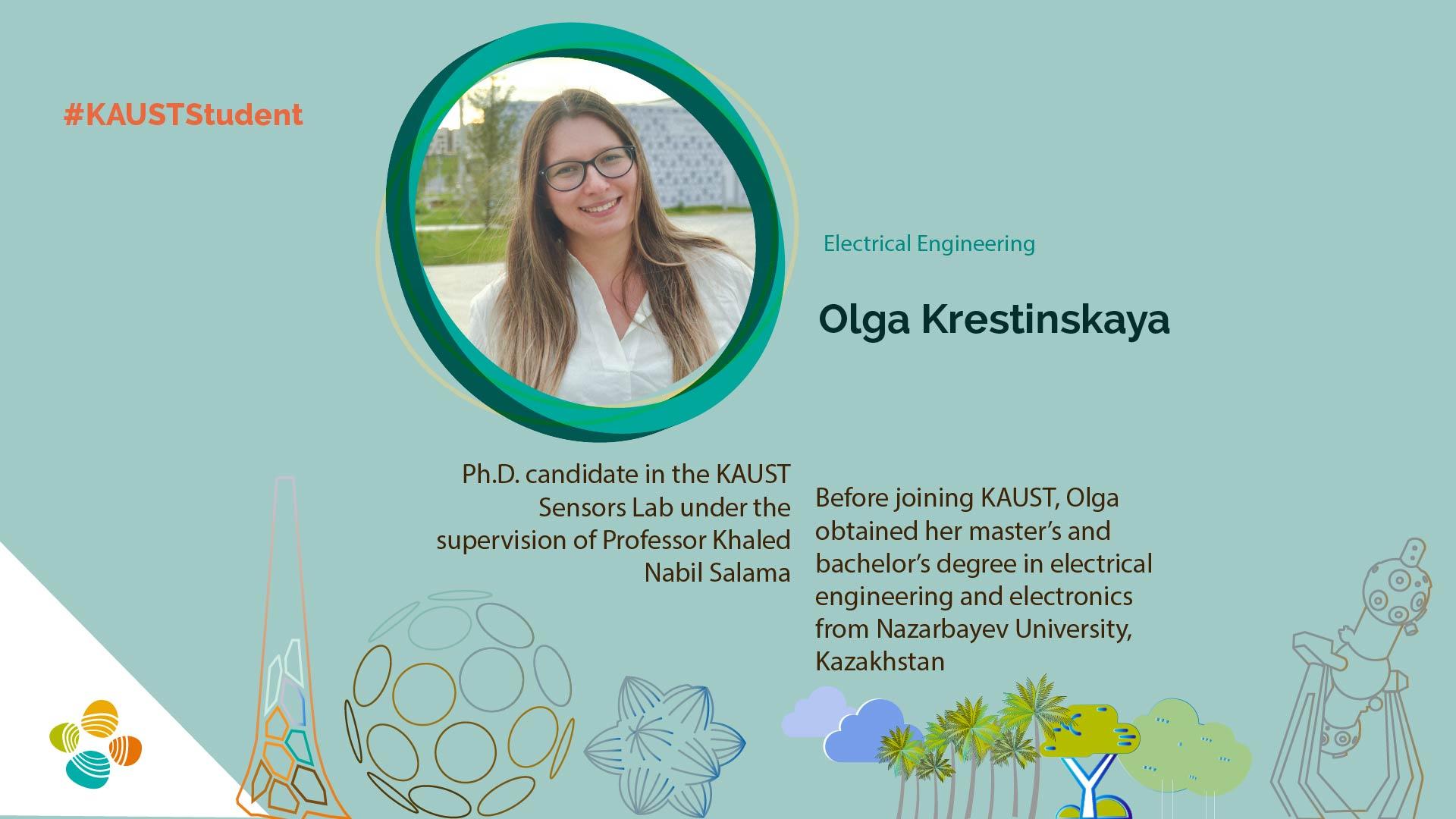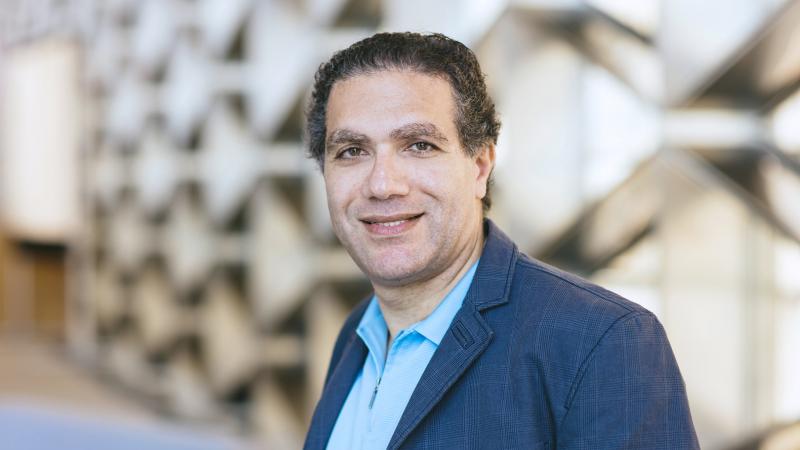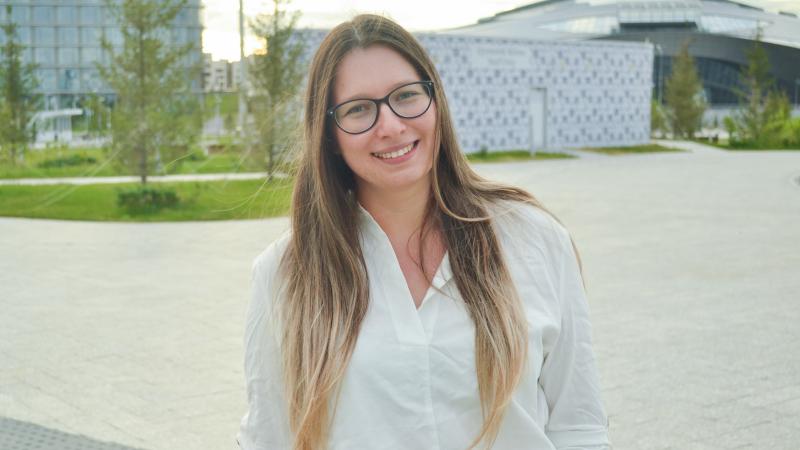-By Taruna Rapaka
Olga Krestinskaya, from Kazakhstan, obtained her master’s and bachelor’s degree in electrical engineering and electronics from Nazarbayev University, Kazakhstan. She is the recipient of the IEEE Circuits and Systems (CAS) society pre-doctoral award in 2019 and will join KAUST in the fall of 2020 as a Ph.D. candidate in the KAUST Sensors Lab under the supervision of Professor Khaled Nabil Salama.
Krestinskaya is passionate about traveling; she loves meeting new people, exploring new destinations, and enjoying the beauty of nature. She enjoys an active lifestyle, hiking and climbing in remote locations, exploring cityscapes, and snorkeling. Outside these activities, Olga dedicates her time to professional development and the advancement of her academic and scientific career. She firmly believes that scientists combine knowledge and creativity to make breakthroughs happen.
What was your main subject during your master’s degree? Why did you choose it?
When I had to make a career choice and select the direction for my studies during my undergrad, I considered electronics to be the most progressive and rapidly growing field. It drives the progress in newly developing edge devices, computers, and AI applications.
During my undergrad, I met Professor A.P. James: the brilliant person who motivated and inspired me to pursue research in neuromorphic circuits and AI hardware. His influence led me to my main M.Sc. project; the development of an analog learning circuit for memristor-based neural networks. Prof. James also encouraged my interest in neuromorphic circuits, brain-inspired architectures, and AI applications.
I'm fascinated by these subjects because the field of AI is developing so fast. This progress is driven by a massive demand for smaller and smarter devices and a desire to integrate intelligent systems into our daily lives.
Why have you chosen to study a Ph.D. at KAUST?
When I had to make a final decision where to pursue Ph.D., I had several great options. This choice was tough — as all the offers I had — were from the institutions with fully-funded scholarships. As I've been a visiting student and intern in KAUST previously, I've seen all the incredible opportunities and facilities provided here for the students. Therefore, I selected KAUST, a relatively new and rapidly growing place. For me, KAUST is a fascinating journey towards my Ph.D. and future career.
KAUST makes a considerable effort to attract the top students, professors, and researchers in every field. This creates a unique international environment where you can meet people from all over the world, and most of them are highly motivated to create and innovate. And this is the place I want to associate myself with. KAUST provides an excellent opportunity to take part in top conferences and undergo the internships in top universities. The university also has great organization and management, and most students' issues are solved quickly, which leads to more free time to focus on your work and research.
Last but most important, I selected KAUST because the people I work with matter to me. I value the freedom of choice and the opportunity to pursue the exact research direction I'm interested in. This was the main reason I finally ended up in KAUST. I'm excited to join Professor Salama's group again, and hopefully, I will have a fruitful Ph.D. journey ahead.
What are your research interests? When did your interest in electrical engineering arise?
My main research area is neuromorphic and brain-inspired hardware, algorithms, and circuits. In particular, I’m focusing on memristor-based architectures for neural networks and neuro-inspired systems. I’m interested in circuit-level implementations of a reconfigurable memristive neural network architecture and optimization of their hyperparameters for edge computing and near-sensor processing applications.
My interest in technical subjects arose during my school years. The most interesting and fascinating topics for me were related to electronic circuits and various combinations of resistors. Later, I applied my interest toward electrical engineering and electronics.
What is your future outlook? Who will be your supervisor at KAUST?
I’m joining Sensors Lab, where my main Ph.D. supervisor will be Professor Salama — a wise professor willing to help his students. At KAUST, I’m planning to work hard and be successful in my Ph.D. while performing high-quality work.
What do you do in your spare time? What are you passionate about?
I enjoy reading non-fiction books and listening to audiobooks. I dedicate time to activities that can support a healthy and active lifestyle, like swimming or gym. Recently, I started jogging and running, and I hope I’ll keep on doing it when in KAUST. I also love discussing world problems with my friends over a cup of coffee; this is a great way for me to be engaged intellectually. "
Can you give a piece of advice to students who plan to pursue an M.S./Ph.D. at KAUST?
I consider KAUST to be a great destination for enthusiastic individuals motivated to pursue research related to their careers. If you pursue your graduate studies here, I would recommend getting engaged in your research as early as possible. Listen to your professors and supervisors and take their advice seriously. Be willing to listen, accept criticism, and improve.
Finally, the most important piece of advice I received was from my supervisor when I started my research journey, and that was to never give up and believe in your skills and abilities. You will face challenges during your graduate studies, but persistence, passion, grit, focus, and hard work are the keys to overcoming any obstacles.


